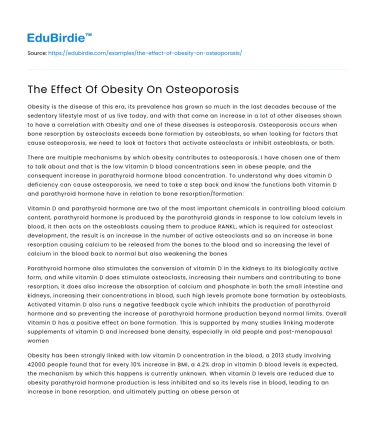Obesity is the disease of this era, its prevalence has grown so much in the last decades because of the sedentary lifestyle most of us live today, and with that came an increase in a lot of other diseases shown to have a correlation with Obesity and one of these diseases is osteoporosis. Osteoporosis occurs when bone resorption by osteoclasts exceeds bone formation by osteoblasts, so when looking for factors that cause osteoporosis, we need to look at factors that activate osteoclasts or inhibit osteoblasts, or both.
There are multiple mechanisms by which obesity contributes to osteoporosis, I have chosen one of them to talk about and that is the low Vitamin D blood concentrations seen in obese people, and the consequent increase in parathyroid hormone blood concentration. To understand why does vitamin D deficiency can cause osteoporosis, we need to take a step back and know the functions both Vitamin D and parathyroid hormone have in relation to bone resorption/formation:
Save your time!
We can take care of your essay
- Proper editing and formatting
- Free revision, title page, and bibliography
- Flexible prices and money-back guarantee
Vitamin D and parathyroid hormone are two of the most important chemicals in controlling blood calcium content, parathyroid hormone is produced by the parathyroid glands in response to low calcium levels in blood, it then acts on the osteoblasts causing them to produce RANKL, which is required for osteoclast development, the result is an increase in the number of active osteoclasts and so an increase in bone resorption causing calcium to be released from the bones to the blood and so increasing the level of calcium in the blood back to normal but also weakening the bones
Parathyroid hormone also stimulates the conversion of vitamin D in the kidneys to its biologically active form, and while vitamin D does stimulate osteoclasts, increasing their numbers and contributing to bone resorption, it does also increase the absorption of calcium and phosphate in both the small intestine and kidneys, increasing their concentrations in blood, such high levels promote bone formation by osteoblasts. Activated Vitamin D also runs a negative feedback cycle which inhibits the production of parathyroid hormone and so preventing the increase of parathyroid hormone production beyond normal limits. Overall Vitamin D has a positive effect on bone formation. This is supported by many studies linking moderate supplements of vitamin D and increased bone density, especially in old people and post-menopausal women
Obesity has been strongly linked with low vitamin D concentration in the blood, a 2013 study involving 42000 people found that for every 10% increase in BMI, a 4.2% drop in vitamin D blood levels is expected, the mechanism by which this happens is currently unknown. When vitamin D levels are reduced due to obesity parathyroid hormone production is less inhibited and so its levels rise in blood, leading to an increase in bone resorption, and ultimately putting an obese person at a higher risk for osteoporosis






 Stuck on your essay?
Stuck on your essay?

